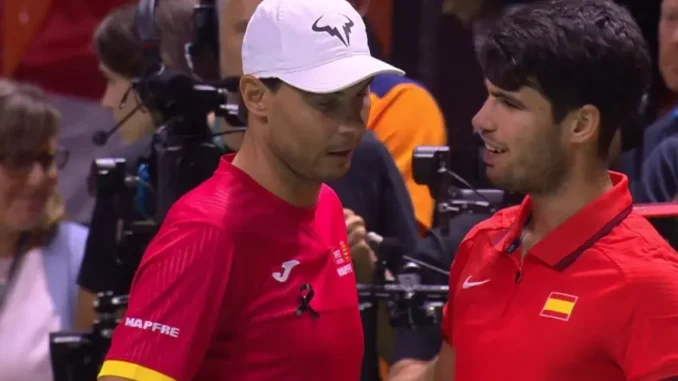
In the ever-evolving world of tennis, few voices carry the weight of Boris Becker’s. The former world No. 1 and six-time Grand Slam champion recently shared his insights on the comparisons between Spain’s rising star, Carlos Alcaraz, and the legendary Rafael Nadal, whose unparalleled dominance on the court has left an indelible mark on the sport. Becker’s commentary, delivered with the authority of a man who has seen tennis’ greatest eras unfold, offers a nuanced perspective on two players who, while sharing a nationality and a flair for clay, are carving distinct paths in the annals of tennis history.
At just 22, Carlos Alcaraz has already etched his name among tennis’ elite, clinching four Grand Slam titles and dazzling fans with his electrifying play. His recent triumphs, including the Monte Carlo Masters and a hard-fought final at the Barcelona Open in 2025, have solidified his status as the world’s No. 3. Yet, the shadow of Rafael Nadal, the 22-time Grand Slam champion who retired in November 2024 after a storied career, looms large. Alcaraz has often been dubbed “the next Nadal,” a comparison that Becker believes is both a compliment and a burden. “Carlos is the most exciting tennis player in the world right now,” Becker remarked, his words brimming with admiration. “But the Spanish, especially the journalists, have to be careful and not judge him so harshly every time he loses a match because he is a very different player from what Nadal was.”
Becker’s analysis hinges on a key distinction: while Alcaraz may possess a natural talent that surpasses even Nadal’s, the latter’s competitive spirit was unmatched. “Carlos has more natural talent, but Rafa’s heart hasn’t been, nor will any other athlete in history have,” Becker said. He painted a vivid picture of Nadal’s ferocity, recalling the dread opponents felt when facing him. “If you saw yourself crossing paths with Nadal in a tournament… Good luck, my friend,” he quipped, underscoring Nadal’s ability to dominate through sheer willpower. This relentless competitiveness, Becker argues, set Nadal apart not only from Alcaraz but also from tennis titans like Novak Djokovic and Roger Federer, whom Becker also holds in high esteem.
The comparisons between Alcaraz and Nadal are inevitable. Both hail from Spain, thrive on clay, and have a knack for delivering breathtaking performances under pressure. Alcaraz’s victory at the 2024 French Open, where Nadal won a record 14 titles, only fueled the narrative that he is Nadal’s heir. Yet, Alcaraz has been vocal about forging his own identity. In his Netflix documentary, Carlos Alcaraz: My Way, he declared, “I don’t want to be called Rafa’s successor. I want to be called Carlos Alcaraz Garfia.” Nadal himself has echoed this sentiment, noting the toll such comparisons can take. “When you’re young and they’re constantly comparing you to some professional that’s been on the circuit for many years, there are times you get tired of hearing it,” Nadal said, reflecting on the pressure Alcaraz faces.
Becker’s concern for Alcaraz extends beyond comparisons to his mental and physical well-being. The young Spaniard’s 2025 season has been a rollercoaster, marked by a first-round exit in Miami and a candid admission that he considered taking a break from tennis. Becker, who met Alcaraz at the Laureus World Sports Awards, issued a poignant warning: “This isn’t a sprint, your life is a marathon.” Drawing from his own experiences as a young prodigy, Becker urged Alcaraz’s team to protect him from burnout, emphasizing the need to balance commitments and preserve the joy of the game. “I was worried for him,” Becker admitted, recalling his own struggles with the relentless demands of fame and competition at a young age.
Despite these challenges, Alcaraz’s potential is undeniable. His versatility across surfaces—evidenced by two Wimbledon titles and a US Open crown at age 19—sets him apart from Nadal, whose dominance was most pronounced on clay. Becker’s hope is that Alcaraz can sustain his career for another decade or more, thrilling fans with his dynamic style. “I hope Carlos plays for another 10 or 15 years,” he said, a testament to his belief in Alcaraz’s staying power.
As Alcaraz prepares for the French Open on May 25, 2025, where he aims to defend his title, Becker’s words serve as both a celebration and a cautionary tale. Alcaraz is not Nadal, nor should he strive to be. With his blend of raw talent and youthful exuberance, he is writing his own chapter in tennis history—one that Becker and fans worldwide are eager to witness unfold.
Leave a Reply